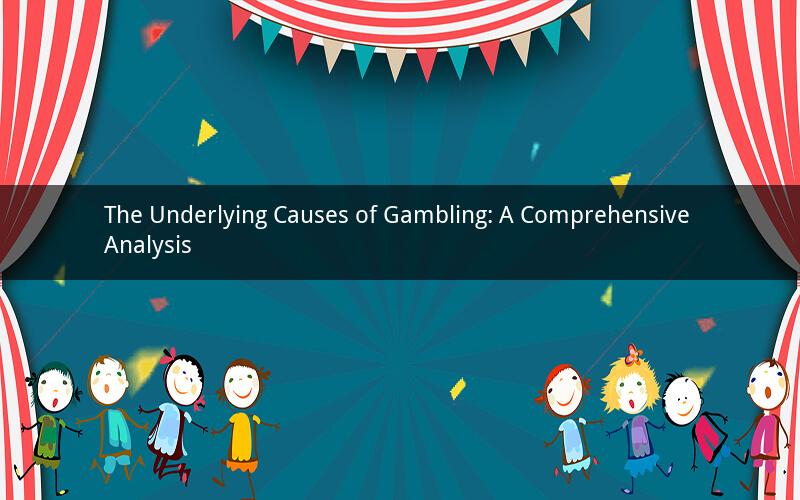
Gambling, an activity that has been around for centuries, continues to captivate individuals across the globe. The allure of potential wealth and the thrill of taking risks make it a compelling pastime for many. However, behind the excitement lies a complex interplay of factors that contribute to the development of gambling behavior. This article delves into the various causes of gambling, exploring psychological, social, and environmental influences that drive individuals to engage in this activity.
1. Psychological Factors
Psychological factors play a significant role in the development of gambling habits. Individuals who exhibit certain personality traits, such as impulsivity, risk-taking, and thrill-seeking, are more prone to engage in gambling activities. Additionally, psychological disorders like depression, anxiety, and addiction can contribute to the development of gambling problems.
a. Impulsivity: Individuals who are impulsive often lack the ability to control their desires and make decisions based on immediate gratification. This impulsivity can lead them to engage in gambling as a means of seeking excitement and instant rewards.
b. Risk-taking: People who are risk-takers tend to enjoy the thrill of uncertainty and the possibility of winning big. They may be drawn to gambling as a way to experience the rush of taking chances and facing potential losses.
c. Depression and anxiety: Individuals suffering from depression or anxiety may turn to gambling as a form of escapism. The temporary relief from their emotional distress can provide a sense of euphoria and distraction, making them more likely to continue engaging in gambling activities.
2. Social Factors
Social factors also play a crucial role in the development of gambling behavior. Peer pressure, family dynamics, and cultural influences can all contribute to the onset of gambling problems.
a. Peer pressure: Individuals who are surrounded by friends or acquaintances who engage in gambling may feel pressured to participate as well. The desire to fit in and be accepted by their social circle can lead them to experiment with gambling.
b. Family dynamics: Growing up in a family with a history of gambling or substance abuse can increase the likelihood of developing gambling problems. Children who witness their parents or siblings engage in risky behaviors may adopt similar patterns in their own lives.
c. Cultural influences: In some cultures, gambling is deeply ingrained in tradition and seen as a legitimate form of entertainment. Individuals from these backgrounds may be more inclined to engage in gambling activities due to societal acceptance and normalization.
3. Environmental Factors
Environmental factors, such as access to gambling venues, exposure to gambling advertisements, and the availability of gambling websites, can also contribute to the development of gambling problems.
a. Access to gambling venues: The proximity and availability of casinos, racetracks, and lottery outlets can make it easier for individuals to engage in gambling activities. The convenience of having gambling options readily accessible can increase the likelihood of developing gambling problems.
b. Exposure to gambling advertisements: Constant exposure to gambling advertisements, whether through television, online platforms, or billboards, can create a sense of allure and desirability. This exposure may influence individuals to try gambling for the first time or exacerbate existing gambling problems.
c. Availability of gambling websites: The rise of online gambling platforms has made it easier than ever for individuals to engage in gambling activities. The convenience and anonymity of online gambling can make it particularly appealing to those who may struggle with impulse control or addiction.
Frequently Asked Questions:
1. Can gambling addiction be cured?
Answer: While there is no definitive cure for gambling addiction, it can be effectively managed and treated. Treatment options may include therapy, support groups, and medication, depending on the severity of the addiction.
2. Is there a genetic component to gambling addiction?
Answer: Yes, research suggests that there is a genetic component to gambling addiction. Certain genetic factors can make individuals more susceptible to developing gambling problems.
3. Can gambling addiction be prevented?
Answer: While it is not possible to prevent gambling addiction entirely, individuals can reduce their risk by being aware of the signs of addiction, avoiding risky situations, and seeking help if needed.
4. Does gambling addiction only affect adults?
Answer: No, gambling addiction can affect individuals of all ages, including children and teenagers. Early intervention and education are crucial in addressing gambling problems among young people.
5. Can gambling addiction lead to other mental health issues?
Answer: Yes, gambling addiction can coexist with other mental health issues, such as depression, anxiety, and substance abuse. It is important for individuals struggling with gambling addiction to seek treatment for all underlying mental health concerns.